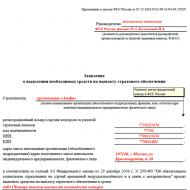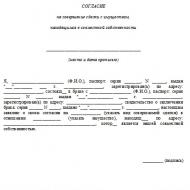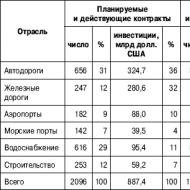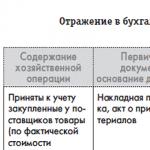
New imperatives for the smart investor. John Bogle - a short biography and books of the man who invented index funds. "My Neighbor is a Millionaire" by Thomas Stanley
This material describes the principles of investing by John Bogle, as well as the books in which he gives advice on investing in the market collective investment. John Bogle pioneered the creation of index funds and revolutionized collective investing. You will learn in this material what investment methods he used to achieve success.
In the introduction to one of his books, John Bogle describes himself this way: “I became known as a rebel in the mutual investing industry. Among the industry's players, I am without a doubt its harshest critic. It's not because I think the industry is bad; rather, because the industry could be much better than it is.”
Bogle's criticism has primarily focused on his peers in the wealth management industry. He criticized them for their closeness and desire to profit from their clients. Of Bogle himself, it was said that “his success in turning Vanguard into an industry giant proves that it is possible to do right by clients and prosper at the same time.”
Vanguard Group, Bogle's brainchild, is one of the largest fund families in the world, with millions of investors and billions of dollars in assets. In creating Vanguard, Bogle used the principles he formulated in his college thesis at Princeton University. The most interesting and important are the following principles:
- minimizing the asset turnover ratio and operating expenses;
- creation of new types of funds;
- honesty and openness in communication with investors.
As part of Vanguard, Bogle proposed working without stock brokers, selling shares directly to shareholders. This was a big advantage for investors because the US uses a system where stock brokers may charge quite a high commission (and determine it independently) for the purchase of fund shares.
In addition, Vanguard's low-cost strategy included minimizing advertising and marketing costs for the company's mutual funds. Compared to other funds, Vanguard's expenses were several times lower.
However, Bogle's main merit is considered to be the study and implementation of index funds. He first proposed the idea of index funds back in his diploma work, and in 1976, Bogle introduced the first stock index fund, essentially a revolutionary breakthrough in the field of collective investment. Bogle's idea was that over the long term, most investors, including mutual funds, underperform the market, and fees further reduce investors' returns. Based on this idea, Bogle created index funds that simply replicate the structure of the entire market or a specific segment of it. Managing such funds does not require the presence of specialists in stock selection and the implementation of a large number of transactions and, therefore, there is an opportunity to significantly reduce investors' costs.
Opinion of Arsager Management Company regarding index funds: An investment product such as an index fund will be in demand only with a developed sales infrastructure. We do not consider ourselves to be a company with such an advantage, so our investment products will be in demand only if we can provide better results than the index through our management over long time intervals. To achieve this result, we compare Russian stocks stock market among ourselves and select the most interesting ones using such an indicator as potential profitability, the calculation of which is based on the forecast of economic indicators of companies.
John Bogle is the author of several books on investing and the collective investment industry. In one of them (“ Common Sense Mutual Funds"), he gives 8 short rules for investing in the collective investment market:
- Choose funds with low costs;
- Approach carefully additional expenses related to receiving recommendations;
- Don't overestimate the fund's past performance;
- Use past performance to determine the stability and risk of a fund;
- Beware of the stars (ie star fund managers);
- Avoid funds that are too large;
- Don't own too many funds;
- Buy a stock portfolio and keep it.
Also, here are excerpts from another book by Bogle (“ Management reasonable investor "), which characterize Bogle's approach to investment:
“All of us investors receive the profits of the stock market, which are distributed among us all. If one received more profit, the other will receive less, and the second one will have less by exactly the same amount as the first one. Without taking into account the costs of investing, you will lose as much as the stock market gains, and vice versa. However, the costs of gambling reduce the winnings of the winners and increase the losses for the losers. Who wins? I think you know. The mediators win..."
“Let's find out why investors in general fail to capture the profits that corporations create by growing their profits and earnings and which are ultimately reflected in the value of their shares. To understand the reasons for this, let's look at simple arithmetic investment: investors as a whole always receive the profit generated by the market in full, but it is also necessary to subtract investment costs from it.”
“After deducting the cost of services of financial intermediaries - all commissions for managing funds and conducting brokerage operations, all premiums investment companies, costs of publishing announcements and other costs - the profit of investors as a whole, naturally, decreases compared to total revenue by the total amount of these costs. If the market gives a 10% return, then we, the investors, collectively receive a gross return of that 10%. (Yeah, right!) But we must pay for the services of our financial intermediaries, and we will only put what is left in our pocket. (And we will have to pay them regardless of whether we made a profit or remained at a loss!).”
“Most investors in the stock market think that they can avoid investment costs by carefully vetting funds and their knowledge, and by buying and selling stocks quickly, always one step ahead of the rest of the players. However, in reality, everything is not so: while those investors who buy and sell last have at least a ghostly chance of a decent profit, then those who show efficiency and efficiency are doomed to losses in advance. According to one study, the most active traders (who make up about a fifth of the market) update their portfolio by more than 21% per month. When stock market returns reached 17.9% per annum between 1990 and 1996, their investment costs were approximately 6.5%, leaving them with returns of no more than 11.4% per annum. It turns out that they received only two-thirds of the profits that the market gave.”
“Investors who, once they put their money in, get out immediately and never pay in vain, dramatically increase their chances of making a handsome profit. Why? Yes, because they buy a business, and the business as a whole brings significant profits, both due to the growth in the value of shares and in the form of dividends. Yes, individual companies often burn out. Firms that base their activities on a deliberately unsuccessful idea, or lack strategic flexibility, or with weak management inevitably become victims of creative destruction - that natural selection that characterizes competitive capitalism; but they disappear only to make room for new, more successful ones. But overall, our healthy economy is showing business growth over the long term.”
Bogle's principles have made him one of the stock market's most controversial figures. Fighting for the honesty and openness of stock market participants, he defended, first of all, the interests of private investors, who began to look up to him when making investments. The index funds created by Bogle are now extremely widespread, and Bogle’s books are republished with enviable regularity, allowing everyone to become familiar with his ideas.
As we know, Thomas Paine's convincing and clearly formulated arguments won the day. The American Revolution gave birth to the US Constitution, which still defines the responsibilities of government, citizens and society today. Inspired by Payne's work, I titled my 1999 book Common Sense on Mutual Funds and challenged investors to free themselves from prejudice and generously think beyond the limits of today. In my new book, I again use the same approach.
If only I could explain true position things to a sufficient number of people and do it thoroughly, deeply and comprehensively, then there is no doubt that everyone would understand everything and everything would be settled.”
In the book Common Sense on Mutual Funds, I quote the words of one of the modern journalists, Michael Kelly, so in tune with my idealistic nature: “The eternal dream of (the idealist) is that if only he could explain the true state of affairs to a sufficient number of people and do it thoroughly, deeply and comprehensively, then there is no doubt that everyone would understand everything and everything would be settled.” This book is my attempt to explain the principles of work financial system those of you who are willing to listen carefully, thoughtfully and meaningfully enough to understand everything and solve all your problems. Maybe not everything, of course, but at a minimum - answer questions related to personal financial well-being.
Some may suggest that in persuading you to share my views, as the founder of Vanguard in 1974 and the world's first index mutual fund in 1975, I am pursuing my own self-interest. Of course it is! Not because it will make me rich (I won't make a penny from it), but because the principles on which Vanguard was founded many years ago (its values, structure and strategies) will make me rich. you.
In the early years of index funds, my voice was like a voice crying in the wilderness. But gradually authoritative and wise people began to appear around, from whose ideas I drew inspiration to fulfill my mission. Many of today's most successful investors are enthusiastic supporters of the concept of index funds, and the approach has met with near-unanimous approval in the academic community. However, you don't have to take my word for it. Listen to independent experts who have no agenda other than to convey the truth about investing. You will find their statements at the end of each chapter.
For example, Paul Samuelson (the Nobel laureate and professor of economics at MIT, to whom I dedicated this book) said: “Thanks to Bogle’s ideas, we, millions of savers, can become the envy of our neighbors in 20 years. Instead, we continue to sleep peacefully, not paying any attention to such impressive opportunities.”
Another way to put it is to use the words of the Shaker hymn: "It's the gift of being simple, it's the gift of being free, it's the gift of being where you belong." Using this approach in relation to investing, we can formulate a rule: simple investing in an index fund frees you from almost all unnecessary expenses associated with the functioning of the financial system, and as a result you get a kind of gift in the form of accumulated savings in the form in which it is it should be, that is, without losses.
The financial system, unfortunately, cannot remain unchanged for a long time. However, changes in the investment climate of various kinds do not mean that you should give up pursuing your own interests when investing. You don't have to take part in any expensive follies. If you choose to play the winning game, that is, buy stocks and refrain from self-defeating attempts to beat the market, then you can start simple: use common sense, understand the system and invest only in accordance with your own principles. This will avoid almost all unnecessary expenses. Finally, whatever earnings the company makes in the coming years (depending in no small part on their performance in the stock and bond markets), you are guaranteed to own a fair share. Once you understand this, you will find that everything is determined solely by common sense.
To properly understand the tricks of investing, the realities of the market and the world of business, you will have to spend a lot of time. Of course, you can’t do without books. But what to read and where to start? Journalists from Yahoo! Finance has compiled a list of the best books on investing.
"The Peter Lynch Method. The Strategy and Tactics of the Individual Investor, Peter Lynch
This book will teach you to think in market and investment terms, and maybe even write about business. Peter Lynch was the head of the legendary Fidelity Magellan fund during its heyday mutual funds. Lynch achieved incredible success by buying shares of leading companies whose performance he had no doubt about: for example, he saw that Dunkin Donuts eateries were always crowded with customers - so he bought their shares.
Lynch also coined the terms two-bagger and three-bagger (for assets that double and triple in value from the time of purchase, respectively). The book is written in simple language and is full of funny stories, so even a newbie investment sphere will read it without difficulty.
"The Intelligent Investor" by Benjamin Graham
“The Intelligent Investor” is a reference book for every investor. It was written by Benjamin Graham, a professor at Columbia University and mentor to the great Warren Buffett. Despite the fact that the book is about 70 years old, Graham's advice is still relevant today - especially on the topic of psychological mistakes of investors.
"My Neighbor is a Millionaire" by Thomas Stanley
"Essays on Investing, Corporate Finance, and Company Management" by Warren Buffett and Lawrence Cunningham
Many books have been written about Buffett, but this one is perhaps the best - after all, it was written by Buffett himself. The book itself is a collection of letters to shareholders, but all these messages together have become a bible for investors.
"Common Sense Mutual Funds" by John Bogle
John Bogle expressed in simple terms the idea that active investing is a losing proposition, and the only effective strategy is to invest in a low-cost, diversified mutual fund (for example, the Vanguard 500 Index fund). Was he right? At least I wasn't wrong.
Warren Buffett called Bogle a "hero" investment world. The book is like its author: it is frank and there are no unnecessary words.
Portfolio diversification and rebalancing, reinvestment dividends and tax accounting - and the financial guide turns into an interesting story.
Prepared by Taya Aryanova
Greetings! We continue our acquaintance with legendary investors who have a lot to learn from. Meet: John Bogle - a successful entrepreneur and investor, creator and former fund manager of The Vanguard Group and author of world best-selling books on investments.
John Bogle is considered the author of the index fund idea. He is also famous for his harsh criticism of management companies. In his view, the private equity industry has little regard for clients' interests. The task of management companies and investment funds is to earn maximum profit for themselves and only themselves. This includes charging clients exorbitant management fees.
Colleagues investment business gave him the sarcastic nickname "Saint Jack". And journalists dubbed Bogle “the conscience of the industry.”
In 2004, Time included him in the TOP 100 most influential people in the world. In his 2017 Annual Letter, Warren Buffett called John Bogle an "investor hero."
Short biography
John Clifton Bogle was born in the crisis year of 1929 in New Jersey (USA). He graduated from college and entered Princeton University.
As a student, John read the article “Boston's Big Money” (Fortune magazine) about a large investment fund, the Wellington Fund. From that moment on, Bogle knew for sure that in the future he wanted to deal only with mutual funds.
After graduating from university he was accepted into unit trust to work. Moreover, to the same Wellington Fund. At 35, he was already an executive vice president. In the mid-1970s, the fund experienced a strong decline, and shareholders withdrew their funds en masse. Bogle was fired from his position. But the next day he returned to the company and proposed a “rescue plan” to management.
The plan was to reduce fees for clients and completely overhaul the Wellington Fund structure. Unfortunately, the fund was never saved. But Bogle did not abandon the idea of “investor orientation.”
On December 30, 1975, the first index fund was born, called the Vanguard 500 Index Fund. John Bogle proposed a revolutionary idea at that time. The fund should not try to beat the market, but only copy its returns using an index.
Books by John Bogle
"Common Sense Mutual Funds"
In my opinion, “Mutual Funds...” is one of the best textbooks for investors (especially for passive investors).
The author reveals many “secrets” in the book. investment funds(which can easily include Russian mutual funds). For example, Bogle explains on his fingers how to identify an unscrupulous management company. The one that is used when working with assets questionable methods, earns money for itself, not for clients, and provides low-quality services.

I’ll give you a few interesting thoughts from the book (the author explains each in detail in the text). Note! We are not talking about index funds, but about actively managed funds.
- “Always choose funds with low costs.”
- "Don't buy too many funds." According to Bogle, the optimal number of funds for a private investor is one or two. If there are more than four of them in the portfolio, this ceases to have any influence on the level of risk.
- “Don’t be fooled by the fund’s past performance.” What John Bogle means is that it is useless to select a fund based on past performance information.
"The Smart Investor's Guide"
The book is a lighter version of the previous book, Mutual Funds from a Common Sense Point of View. But it is no longer overloaded with information, excessive volume and emphasized orientation towards American markets.
Here are a couple of reviews of the book from legendary investors.
Warren Buffett: "A low-cost index fund is the most profitable option for the vast majority of investors. Why? Read John Bogle's book and you will find out."
William Bernstein: “Wall Street is robbing you of your future. If you want to stop financial fraudsters, read this book."
"Don't trust the numbers!"
Let me start with the fact that the book has a surprisingly long title: “Don’t believe the numbers! Reflections on Investor Misconceptions, Capitalism, Mutual Funds, Index Investing, Entrepreneurship, Idealism, and Heroes."
Why is the name more like summary? Because the book is a collection of essays, lectures and articles by Bogle on completely different topics. The materials were written by him over ten years since 2000.

Overall, the book “Don’t Trust the Numbers!” on how to make adequate decisions in business and the financial and investment sphere. And, of course, that this very adequacy is sorely lacking today. John Bogle writes about how we deceive ourselves and what consequences this leads to.
The book clearly shows how the financial “kitchen” works from the inside. You can trust the author - he has been involved in the investment field for more than 50 years. John Bogle writes a lot about work management company. In particular, about how management managers care not about clients, but about their own bonuses.
The work is written in a lively and accessible language, with a lot of illustrative examples and numbers. Of the minuses, I would note the following. Like other books by US authors, Don't Trust the Numbers! intended for American readers. Analysis financial sector United States, references to American books, films and episodes from history. If all the material in the book were transferred to Russian realities, there would be no price for it.
A few rules of entrepreneurship from John Bogle's book:
- "Don't underestimate the obvious."
- “You can catch luck by the tail many times.”
- “Take the least traveled path.”
“Investors versus speculators. Who Really Runs the Stock Market?
John Bogle wrote this book relatively recently: in 2012. Main thesis: in our time, culture long-term investment crowd out short-term speculation. But you cannot be both a speculator and an investor at the same time. You need to choose: greed or fear, a peaceful sleep or a beautiful life for a couple of years?
Have you read John Bogle's books?
To narrow down the search results, you can refine your query by specifying the fields to search for. The list of fields is presented above. For example:
You can search in several fields at the same time:
Logical operators
The default operator is AND.
Operator AND means that the document must match all elements in the group:
research development
Operator OR means that the document must match one of the values in the group:
study OR development
Operator NOT excludes documents containing this element:
study NOT development
Search type
When writing a query, you can specify the method in which the phrase will be searched. Four methods are supported: search taking into account morphology, without morphology, prefix search, phrase search.
By default, the search is performed taking into account morphology.
To search without morphology, just put a “dollar” sign in front of the words in the phrase:
$ study $ development
To search for a prefix, you need to put an asterisk after the query:
study *
To search for a phrase, you need to enclose the query in double quotes:
" research and development "
Search by synonyms
To include synonyms of a word in the search results, you need to put a hash " #
" before a word or before an expression in parentheses.
When applied to one word, up to three synonyms will be found for it.
When applied to a parenthetical expression, a synonym will be added to each word if one is found.
Not compatible with morphology-free search, prefix search, or phrase search.
# study
Grouping
In order to group search phrases you need to use brackets. This allows you to control the Boolean logic of the request.
For example, you need to make a request: find documents whose author is Ivanov or Petrov, and the title contains the words research or development:
Approximate word search
For approximate search you need to put a tilde " ~ " at the end of a word from a phrase. For example:
bromine ~
When searching, words such as "bromine", "rum", "industrial", etc. will be found.
You can additionally specify the maximum number of possible edits: 0, 1 or 2. For example:
bromine ~1
By default, 2 edits are allowed.
Proximity criterion
To search by proximity criterion, you need to put a tilde " ~ " at the end of the phrase. For example, to find documents with the words research and development within 2 words, use the following query:
" research development "~2
Relevance of expressions
To change the relevance of individual expressions in the search, use the " sign ^
" at the end of the expression, followed by the level of relevance of this expression in relation to the others.
The higher the level, the more relevant the expression is.
For example, in this expression, the word “research” is four times more relevant than the word “development”:
study ^4 development
By default, the level is 1. Valid values are a positive real number.
Search within an interval
To indicate the interval in which the value of a field should be located, you should indicate the boundary values in parentheses, separated by the operator TO.
Lexicographic sorting will be performed.
Such a query will return results with an author starting from Ivanov and ending with Petrov, but Ivanov and Petrov will not be included in the result.
To include a value in a range, use square brackets. To exclude a value, use curly braces.
















